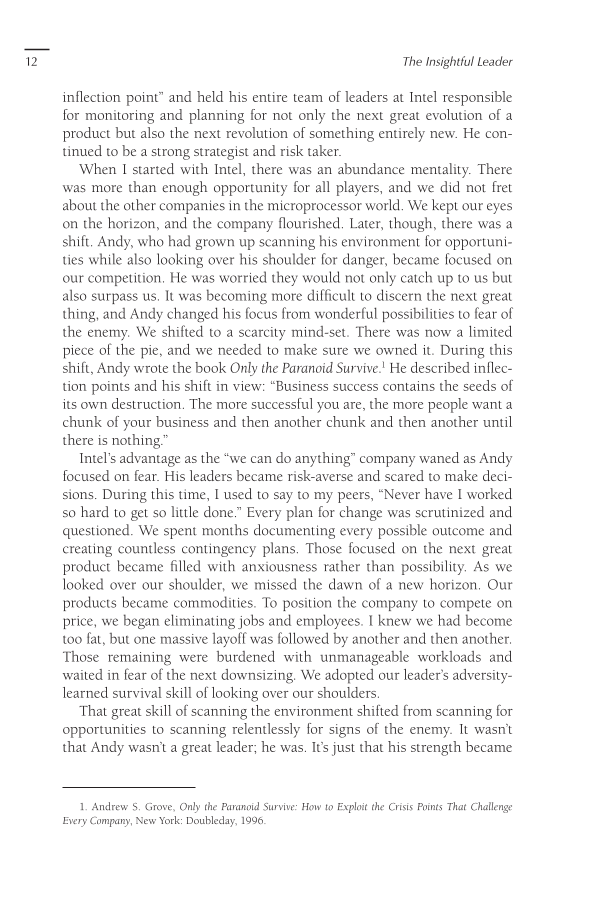12 The Insightful Leader inflection point” and held his entire team of leaders at Intel responsible for monitoring and planning for not only the next great evolution of a product but also the next revolution of something entirely new. He con- tinued to be a strong strategist and risk taker. When I started with Intel, there was an abundance mentality. There was more than enough opportunity for all players, and we did not fret about the other companies in the microprocessor world. We kept our eyes on the horizon, and the company flourished. Later, though, there was a shift. Andy, who had grown up scanning his environment for opportuni- ties while also looking over his shoulder for danger, became focused on our competition. He was worried they would not only catch up to us but also surpass us. It was becoming more difficult to discern the next great thing, and Andy changed his focus from wonderful possibilities to fear of the enemy. We shifted to a scarcity mind-set. There was now a limited piece of the pie, and we needed to make sure we owned it. During this shift, Andy wrote the book Only the Paranoid Survive.1 He described inflec- tion points and his shift in view: “Business success contains the seeds of its own destruction. The more successful you are, the more people want a chunk of your business and then another chunk and then another until there is nothing.” Intel’s advantage as the “we can do anything” company waned as Andy focused on fear. His leaders became risk-averse and scared to make deci- sions. During this time, I used to say to my peers, “Never have I worked so hard to get so little done.” Every plan for change was scrutinized and questioned. We spent months documenting every possible outcome and creating countless contingency plans. Those focused on the next great product became filled with anxiousness rather than possibility. As we looked over our shoulder, we missed the dawn of a new horizon. Our products became commodities. To position the company to compete on price, we began eliminating jobs and employees. I knew we had become too fat, but one massive layoff was followed by another and then another. Those remaining were burdened with unmanageable workloads and waited in fear of the next downsizing. We adopted our leader’s adversity- learned survival skill of looking over our shoulders. That great skill of scanning the environment shifted from scanning for opportunities to scanning relentlessly for signs of the enemy. It wasn’t that Andy wasn’t a great leader he was. It’s just that his strength became 1. Andrew S. Grove, Only the Paranoid Survive: How to Exploit the Crisis Points That Challenge Every Company, New York: Doubleday, 1996.
Document Details My Account Print multiple pages
Print
You have printed 0 times in the last 24 hours.
Your print count will reset on at .
You may print 0 more time(s) before then.
You may print a maximum of 0 pages at a time.


















































































































































































